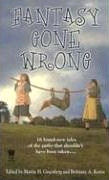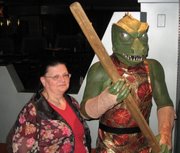I spent a weekend in February at the Radcon science fiction convention, a great SF gathering in
Disclaimer: there will be grammar glitches throughout this rant, since using “they” and “them” for individuals is awkward. But I am trying to avoid “him” and “her” in order to protect the innocent and guilty alike.
My husband (writer J. Steven York) and I have been attending conventions for more than 20 years – a number that I find utterly amazing. It seems hard to believe that our first “con” was that long ago, in
Since that first Norwescon, we have attended as many as five or six conventions and conferences a year, and as few as one or two. Finances, deadlines, day jobs, kids, all dictate how much time and money we can put into these trips. And as we get older, the preparation, travel and recovery take a little longer, too, though I hate to admit it.
But I had an unusual experience this weekend, and it got me to thinking. Although I’ve been doing this for years, I got to watch a very talented friend go through their first con, and make some mistakes. We all make mistakes in unfamiliar circumstances, and their mistakes were different from my first-timer missteps, but the vantage point of 20+ years experience allowed me to see some of the reasons these mistakes happened.
It wasn’t just ignorance, though that’s part of it. It’s the mixed signals you get at a convention. There are many flavors of cons/seminars/workshops, and you may not know whether you’re getting Chocolate Ripple, or Raspberry Sherbet, or maybe even Spumoni. Each one delicious, each one appropriate to its own time and place, and each one incompatible with the others.
So, I’ve been thinking about what marks the difference among these various styles of gathering, and what the rules are for each. I hope some people will disagree with me, or point out where I am dead wrong, but I think this is a discussion we ought to have. And just maybe I can save someone from a mistake of their own.
Since it’s what’s at the front of my mind, I want to talk about fan conventions first.
The first writer gathering I ever attended as an adult, was a Norwescon. It was a largish (2,000?) science fiction convention, held in an airport hotel in
Over the years, conventions have tightened up a little. There are no longer open bars in hospitality, although there is frequently beer, and more potent potables at the many private room parties. “Nudity is not a costume” is another rule that has come into being. There are tracks of age-appropriate programming for kids, many of whom are the offspring of people who were teens at those first conventions I attended. But there is still an attitude of “almost anything goes,” an acceptance of behavior that only vaguely resembles normalcy, and the feeling that you are in a little cocoon of fun and frivolity where most of the rules are suspended.
And it is that atmosphere that gets writers into trouble. If we, as the attending pro writers (and artists, and editors, and game designers, and so on), buy into the permissiveness and acceptance, if we suspend our rules of behavior, if we party a little too much, we are hurting ourselves and our reputations. Unfortunately, even though it feels like anything is acceptable, it isn’t. If you’re a writer, you’re at work, not at play.
Sure, you can have a drink at a party, or a beer in hospitality. But if you get falling-down drunk, people will remember. There is someone who will forever be remembered as having been found passed out in their own vomit in a public restroom. Not the way you want to be remembered.
You can hook-up with someone. One-night stands are a fact of convention life, many of them fueled by the above-mentioned potables. But be discreet. There is someone else who will always be remembered as blatantly hooking up with star-struck fans, while their spouse fumed; and another someone who told horror stories of the stalker-style behavior of a one-night stand. And there are always the gropers who, encouraged by the alcohol and atmosphere, think they have a right to grab anyone and anything that gets close.
And the costumes! Nothing says “don’t take me seriously” more than an over-exposed cleavage, fur jockstrap, or Darth Vader helmet. They have their place, and are certainly appropriate if you’re a professional costumer/armorer/FX wizard (there was one of those at Radcon, a truly amazing talent, and on him it looks real good), but for a writer, not so much. You don’t have to wear a suit and tie, or carry a briefcase – in fact, you’ll stand out if you do – but generally speaking you have to dress appropriately. There are writers and editors who have an image – loud ties, or Hawaiian shirts – but it’s a look, not a costume. Trust me, you better know the difference, and you better be able to dial it back if it isn’t working for you.
Conventions are a tiny, tiny community. While you are in the hotel, it’s like being in a very small town, with nosy, gossipy neighbors. People you meet may be long-time friends with other people, and you may not know it. Watch who you bad-mouth! Many years ago, I had one convention committee member sit down and kevetch about two other committee members – both of whom were dear friends of mine. The kevetch-er didn’t know what my relationship was with the kevetch-ees, and I will always remember them as the person who was so nasty about my friends. We are cordial, and I never brought it up, but we will never be good friends, and they will never know why.
And just like a small town, someone is always watching you. What you might think is a private misstep, an unobserved mistake, will be seen. Unless you’re by yourself, behind a closed and locked door, with no one else in the room, always assume you are being watched. Not because you have a stalker (thought that’s possible, refer back to one-night stands), but simply because this is a place where we all know each other, and we’re in a very small space 24/7. Someone will see you.
I’m sure I’m forgetting something, and that you’ll remind me of it. But consider this the beginning of an on-going discussion of conventions, conferences, workshops, seminars, and all the other Baskin-Robbins array of gatherings that are out there. Knowing when you’re ordering Tutti Fruiti might just save you some heartaches and embarrassment.
And to my friend who started this train of thought: Don’t give up. One silly mistake does not tank your career. You’ll get over it, as long as you learn from it and move on. And you’re too damned brilliant to give up now.















4 comments:
Wouldn't it be nice if there was a guidebook available at every convention? I've seen conventions actually have panels about how to manage your first con and always thought they were incredibly smart programming.
Of course, in some respects, navigating one's first convention is a little like discovering your inner adult, no matter how much it may seem like you're there to release your inner child. What I mean by this is that conventions are environments where you have to figure out the boundaries of good taste and appropriate behavior. If you come to such an event without a pretty strong sense of yourself as a professional (and what being a pro means), mistakes are bound to happen.
The trick, of course, once you've jumped through the flaming hoop of your first convention, is learning from your mistakes. Some people are more willing and able than others to reflect on their behavior and make the necessary changes.
I've seen the "first convention" panels - usually earlier in the programming schedule than new fans might be expected to attend, unfortunately. But I too think they're a great idea.
It might be nice, additionally, for some cons to have "first cons for pros" panels.
There are "first con" guides online as well. Maybe from this discussion there will come a pro version.
I've been attending SF&F conventions about as long as you have -- my first was AggieCon in 1982 -- and I have to agree in gneeral with your guidelines.
A rule I rigorously follow is "Never say anything you cannot afford to have widely quoted.. and badly quoted."
Another writer misbehavior I've seen is assuming that good-looking con staffers, especially gophers and guest wranglers, of the preferred gender are there for the taking. A polite pass won't usually earn the writer a mark of infamy, but being insistent will. Being drunk and insistent definitely will.
But the worst behavior I've seen -- worst in its frequency and prevalence -- is for a writer to forget that conventions are about and for the fans. Any pro who thinks that a convention is about him or her is doing everyone a disservice, and probably going down in that con's informal history as an egotistical chump.
-- Aaron "Hawaiian Shirts" Allston
Frank Wu has an interesting thread going on his LJ about appropriate dress for pros, here (http://frankwu.livejournal.com/20287.html?view=210239#t2102390
Frank's take: Guys in suits don't give money to people in chicken suits. They give money to people who put other people in chicken suits.
Alan Clark's take (from a personal conversation I had with him a while back): Be conservative in your personal life so you can be insane in your art.
At this RadCon, we actually did have a "First Cons For NeoPros" panel. I was on it. We did mention "Don't drink to excess" and "Dress Appropriately" and "Be polite to everyone you meet, no matter how bad they smell". I don't think it was attended by any actual visiting pros, alas.
Post a Comment